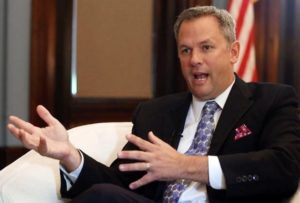by WorldTribune Staff, March 21, 2017
North Carolina’s economy continues to roll in the aftermath of high-profile boycotts by the NCAA, the NBA, and the Boss over the state’s HB2 transgender bathroom bill.
Earlier this month, Lt. Gov. Dan Forest told Texas lawmakers, who are considering a bill similar to HB2, that the economic effect of the boycott in North Carolina was “less than one-tenth of 1 percent” of the state’s annual gross domestic product.

The NCAA canceled several of its championships slated to be held in North Carolina, the NBA All-Star Game was moved out of Charlotte and Bruce Springsteen and several other bands canceled gigs over their opposition to HB2.
“Suffice it to say, our economy is doing well,” said Forest, a Republican. “Don’t be fooled by the media; this issue is not about the economy. This issue is about privacy, safety and security in the most vulnerable places we go. This is about doing the right thing. And I will never trade the privacy, safety and security of a woman or a child for a basketball ticket, and neither should you.”
Amid the boycotts, the state’s economy “didn’t miss a beat,” The Washington Times reported on March 20.
The report cited data showing North Carolina’s hotel occupancy, room rates and demand for rooms set records in 2016 and the state ranked fourth in the nation for attracting and expanding businesses.
Even with the cancellation of seven NCAA championships, the relocation of the All-Star Game and concert cancellations by Springsteen, Ringo Starr, Pearl Jam, Boston, Maroon 5 and Cirque de Soleil, hotel and motel occupancy increased last year by 3.4 percent over 2015, and “each month of 2016 experienced the highest occupancy on record,” according to VisitNC.
The average room rate of $98.88 per night represented a 3.6 percent jump from 2015, which also set a state record and exceeded the national increase of 3.1 percent, the Washington Times report said.
The strong hotel performance “indicates more people are visiting North Carolina and hotel operators are bringing in more revenues,” despite the “predictions of doom-and-gloom for North Carolina,” said the advocacy group 2ndVote.
Forest said the sports leagues may have hurt themselves more than North Carolina. A week before the game was played, the NBA had “the lowest ticket sales” in All-Star Game history, he said.
“So they lost money comparatively to what they would have made in Charlotte,” Forest said. “The other one was the ACC championship football game that’s been hosted year over year (in North Carolina). They moved it to Orlando and had the lowest attendance in history, again losing money.”
Meanwhile, North Carolina ranked fourth in the nation for attracting and expanding businesses with the arrival of 289 major projects, according to Site Selection magazine, which released its 2016 rankings in its March edition.
North Carolina finished first for drawing corporate facilities in the eight-state South Atlantic region, said Site Selection, which uses figures tracked by the Conway Projects Database.
PayPal canceled plans last year to construct an operations center in Charlotte that would have employed about 400, but other companies have stepped in. Already this year, Moen, Corning and Alevo have announced in-state expansions, bringing in about 650 jobs over the next several years.
And in November, both Forbes and Site Selection magazine ranked North Carolina the No. 2 state for business climate.
“The figures released almost exactly a year after the bill’s passage appear to fly in the face of predictions of economic doom made by opponents of HB2,” the Times report said.
Taking issue with that assessment was Chris Sgro, a former Democratic state legislator who now heads EqualityNC. He said the figures fail to take into account what would have happened without the so-called bathroom bill.
“It is a universally agreed-upon fact at this point that HB2 is hurting the state of North Carolina economically,” Mr. Sgro said.
Gov. Roy Cooper, a Democrat who defeated incumbent Pat McCrory in the November election, campaigned on repealing the law.
“It is incredibly clear to everybody that HB2 has done a detriment to the state of North Carolina,” Cooper said. “We would be doing drastically better economically if this discriminatory law wasn’t on the books.”
Whether or not the boycotts are working is ambiguous, Governing magazine concluded:
“Yes, boycotts work if the main point is delivering a message. No, boycotts don’t work if the goal is inflicting economic damage, though some state industries are more vulnerable than others.”
